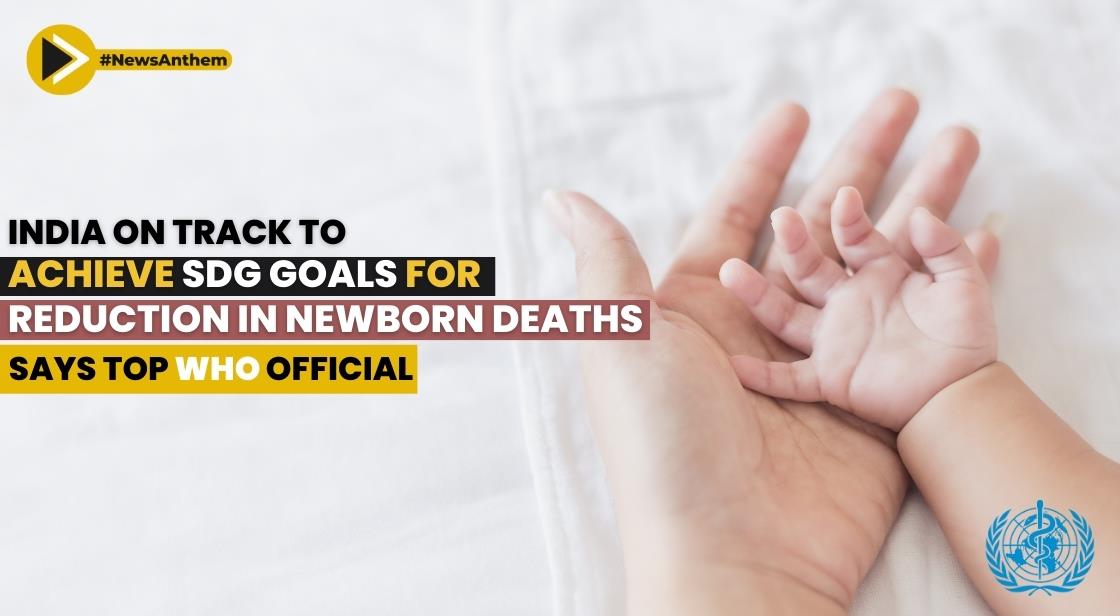India on Track to Achieve SDG Goals for Reduction in Newborn Deaths, Says Top WHO Official

News Synopsis
India's Proactive Measures to Reduce Newborn Deaths Recognized by WHO
India's proactive approach in reducing neonatal mortality has earned recognition from a top official at the World Health Organization (WHO). According to data on the annual rate of reduction in newborn deaths between 2016 and 2021, India is likely to achieve its Sustainable Development Goal targets in this critical area by 2030.
India's Efforts Yield Positive Outcomes in Maternal and Newborn Health
Dr. Anshu Banerjee, Director of the Department of Maternal, Newborn, Child and Adolescent Health and Ageing at WHO, commended India for taking important steps to improve the quality of care during labor and childbirth, resulting in reductions in maternal deaths. These efforts are expected to yield better outcomes for newborns and contribute to achieving SDG targets.kangaroo mother care,SUMAN,
Positive Outlook Based on Annual Rate of Reduction in Newborn Deaths
Dr. Banerjee highlighted that if the annual rate of reduction for newborn deaths observed between 2016 and 2021 is applied to the period of 2022-2030, it is likely that India will successfully achieve the Sustainable Development Goal targets. This positive outlook reflects the progress made and the country's commitment to further advancements in maternal and newborn health.
India's Proactive Approach and Strong Policies in Neonatal Care
India's proactive measures to accelerate neonatal mortality reduction were acknowledged by Dr. Banerjee. The country has strengthened policies and planning for newborn health, establishing an extensive newborn care program at both health facility and community levels. This includes dedicated Newborn Care Corners, Newborn Stabilization Units, and a network of newborn care units across districts.
Global Collaboration and Impact of Maternal Newborn Health Conference
Dr. Banerjee addressed various sessions at the International Maternal Newborn Health Conference (IMNHC 2023), held from May 8-11. The conference, hosted by the government of South Africa and AlignMNH, aimed to drive global initiatives in collaboration with organizations such as the Bill and Melinda Gates Foundation, USAID, UNFPA, UNICEF, and the World Bank. Such initiatives facilitate knowledge sharing and foster progress in maternal and newborn health.
Emphasizing the Importance of Preterm Births and Double Burden of Malnutrition
Dr. Banerjee emphasized that complications related to preterm births are now the leading cause of under-five child deaths worldwide. Addressing the double burden of malnutrition, he highlighted the need for simultaneous interventions to address both undernutrition and obesity. Achieving global newborn health and survival targets requires investment and implementation of preventive measures, high-quality care during pregnancy, and support for small and sick newborns.
WHO's Focus on Kangaroo Mother Care and New Resources
The WHO is set to launch new resources to support the wider implementation of kangaroo mother care, a lifesaving technique involving skin-to-skin contact and exclusive breastfeeding. The goal is to ensure preterm babies worldwide have the best chance of survival. This initiative demonstrates the organization's commitment to improving newborn care globally.
Success Stories and Learnings from India's Policies
Dr. Banerjee emphasized that India can draw inspiration from success stories within the country itself. The state of Kerala, for instance, has achieved a commendable maternal mortality rate of 19 per 100,000 live births, closely followed by a few other states. These achievements have been made possible through the implementation of quality standards in obstetric care, improvements in emergency response during childbirth, and a focus on reducing inequities in access to quality care in both public and private healthcare facilities.
Highlighting the achievements of Sri Lanka in South Asia, Dr. Banerjee pointed out that the country has achieved remarkable success in improving maternal and newborn health with limited financial resources. Sri Lanka's approach has revolved around universal health coverage, the deployment of professional midwives for skilled birth attendance, and ensuring the quality of care.
Learnings from India's policies to reduce maternal and neonatal mortality include the importance of leadership and commitment at the highest level, as well as unique schemes and policies that address access to quality care. Initiatives like SUMAN, which aims to provide assured, dignified, and free healthcare for women and newborns, have been instrumental. Additionally, schemes ensuring antenatal care services and interventions during labor and childbirth have played a significant role in reducing preventable deaths.
Addressing the Global Challenge of Undernutrition and Obesity
Dr. Banerjee acknowledged the dual challenge of undernutrition and obesity faced by many countries, particularly with urbanization. While undernutrition continues to contribute to sickness and mortality worldwide, rising rates of obesity have led to an increase in non-communicable diseases. This double burden of malnutrition necessitates simultaneous interventions to tackle both ends of the spectrum.
To address this challenge, Dr. Banerjee emphasized the importance of "double-duty actions" that can reduce both undernutrition and obesity. These actions include continued support and promotion of breastfeeding, ensuring high-quality care during pregnancy, and delivering supplemental food products that are highly nutritious without unhealthy components such as fats and sugars.
Leveraging Digital Platforms for Maternal and Newborn Health
India has introduced several IT initiatives to leverage digital platforms in supporting health service provision for pregnant women and children. Mobile technology is being used in several states to monitor and respond to the health status of mothers and newborns, enabling effective healthcare delivery. These initiatives showcase the country's commitment to leveraging technology for better maternal and newborn health outcomes.
As the WHO continues to focus on improving maternal and newborn health globally, the launch of new resources for the wider roll-out of kangaroo mother care will enhance the chances of survival for preterm babies. By providing skin-to-skin contact and encouraging exclusive breastfeeding, this technique has proven to be lifesaving.
Important News Tags and Headlines for Readers
India's proactive measures and strong policies in reducing newborn deaths, as well as its commitment to improving maternal and newborn health, have garnered recognition from the WHO. With continued efforts and the implementation of evidence-based practices, India is on track to achieve its SDG goals in reducing neonatal mortality. The country's success stories and learnings can serve as valuable examples for other nations striving to improve maternal and newborn health outcomes.
You May Like









